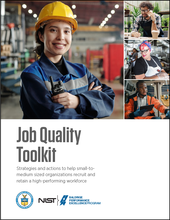Job Quality Toolkit

An outgrowth of a three-year partnership with the U.S. Department of Commerce (DOC) and U.S. Department of Labor to support various workforce excellence initiatives, the Baldrige Performance Excellence Program (BPEP) led the effort to develop a Job Quality Toolkit, a menu of vetted strategies and actions for leaders and their workforces to collaboratively choose from to increase the quality of jobs offered. The Baldrige Excellence Framework® served as a foundation for the easy-to-use toolkit that is intended for organizations of all kinds—but especially for those that are small and medium sized.
To develop the toolkit, BPEP conducted a thorough literature search and engaged with more than 60 national experts, nonprofits, businesses, academics, and government leaders. The toolkit was formally launched by both Secretaries of Commerce and Labor on August 4, 2022.
The Manufacturing Extension Partnership (MEP) of the National Institute of Standards and Technology has adopted and is distributing the Job Quality Toolkit. This includes a partnership with AmericaWorks, which is hosting an online Job Quality Employer Assessment. Another implementing partner is Public Private Strategies Institute, which received a grant associated with its job quality initiative. Aspects of the Job Quality Toolkit are also incorporated in DOC’s National Technical Information Service Notice of Funding Opportunity and the CHIPS (Creating Helpful Incentives to Produce Semiconductors) and Science Act Notice of Funding Opportunity.
Drivers of Job Quality

Recruitment & Hiring
Actively recruit a diverse pool of applicants. Implement skills-based hiring that only requires the education, credentials, and experience needed to do the job. Be intentional about onboarding and retaining workers.

Benefits
Seek workers’ input on needed and desired benefits, such as paid leave, health insurance, and a retirement plan. Provide them and encourage their use.

Diversity, Equity, Inclusion, & Accessibility
Make equal opportunity a core value and practiced norm. Foster systems where all workers feel respected and empowered in the workplace. Identify and remove systemic barriers to DEIA.

Empowerment & Representation
Ensure that workers have a meaningful voice, without fear of retaliation. Enable workers to contribute to decisions about their work, how it is performed, and organizational direction.

Job Security & Working Conditions
Ensure a safe, healthy, and accessible workplace and offer job security. Minimize temporary or contractor labor solutions, using such workers mainly to adjust for short-term needs. Assess and
schedule hours that are adequate and predictable.

Organizational Culture
Demonstrate through explicit behaviors and norms of leadership that all workers belong, are valued, and contribute meaningfully to the organization. Assess workers’ engagement and feelings of respect.

Pay
Provide an equitable living wage to all workers and ensure fair compensation practices.

Skills & Career Advancement
Provide opportunities and tools for workers’ self-realization and advancement in their current jobs, within the organization, and outside it.
Job Quality Baldrige Style
See how Baldrige Award recipients demonstrate many of the strategies and actions recommended in the Job Quality Toolkit.
Contacts
-
Baldrige Customer Service(301) 975-2036NIST/BPEP
100 Bureau Drive, M/S 1020
Gaithersburg, MD 20899-1020

